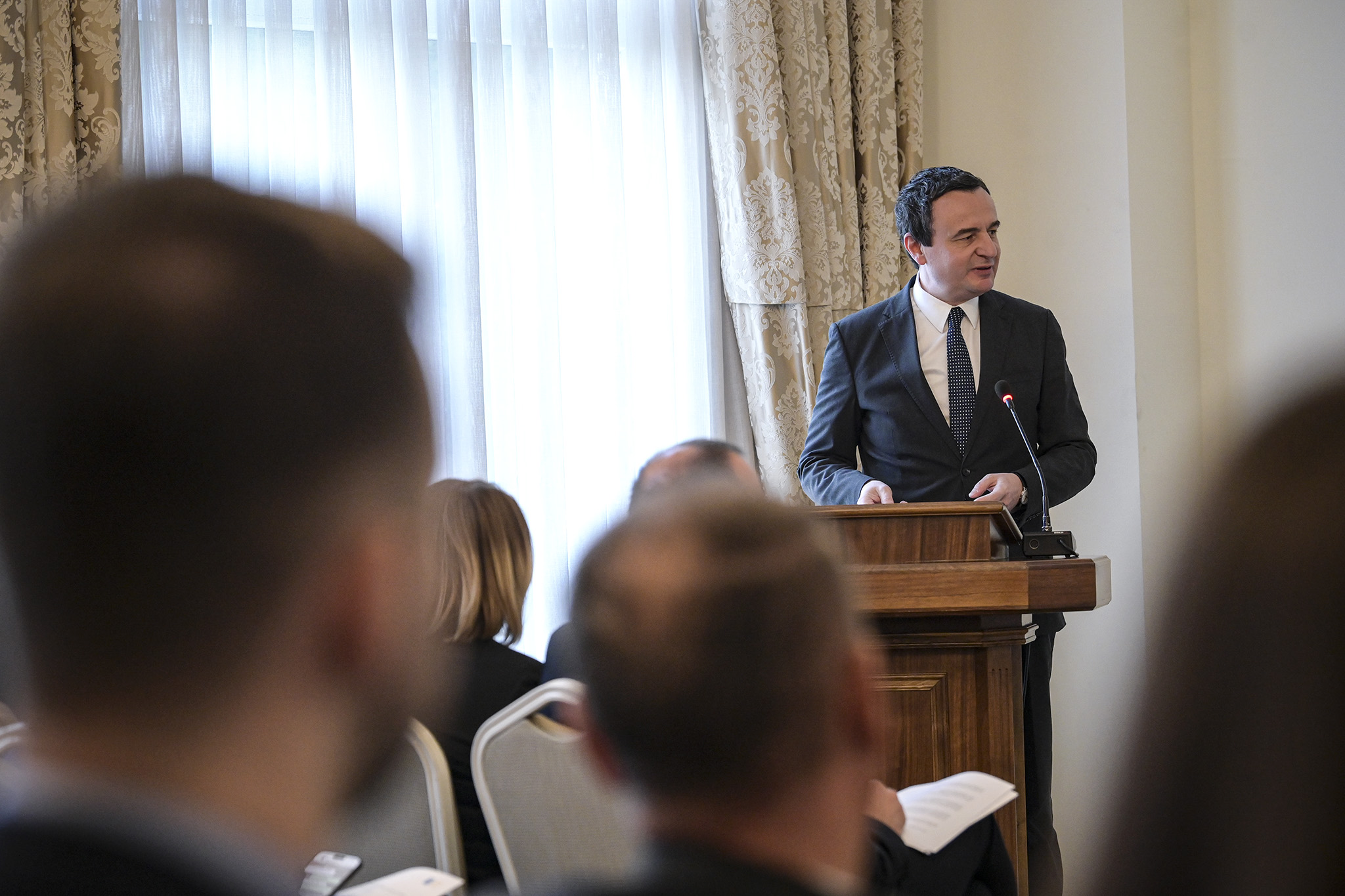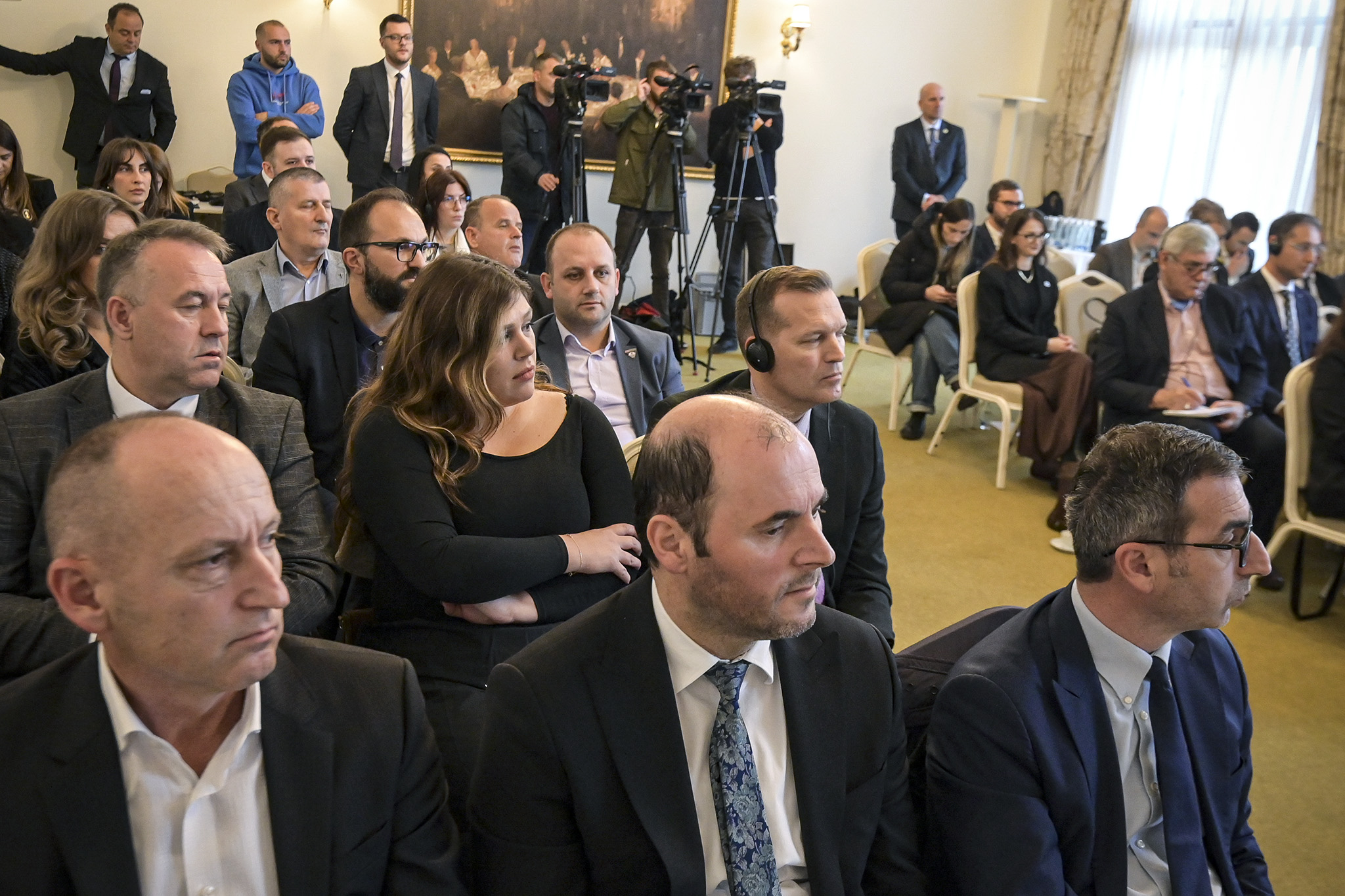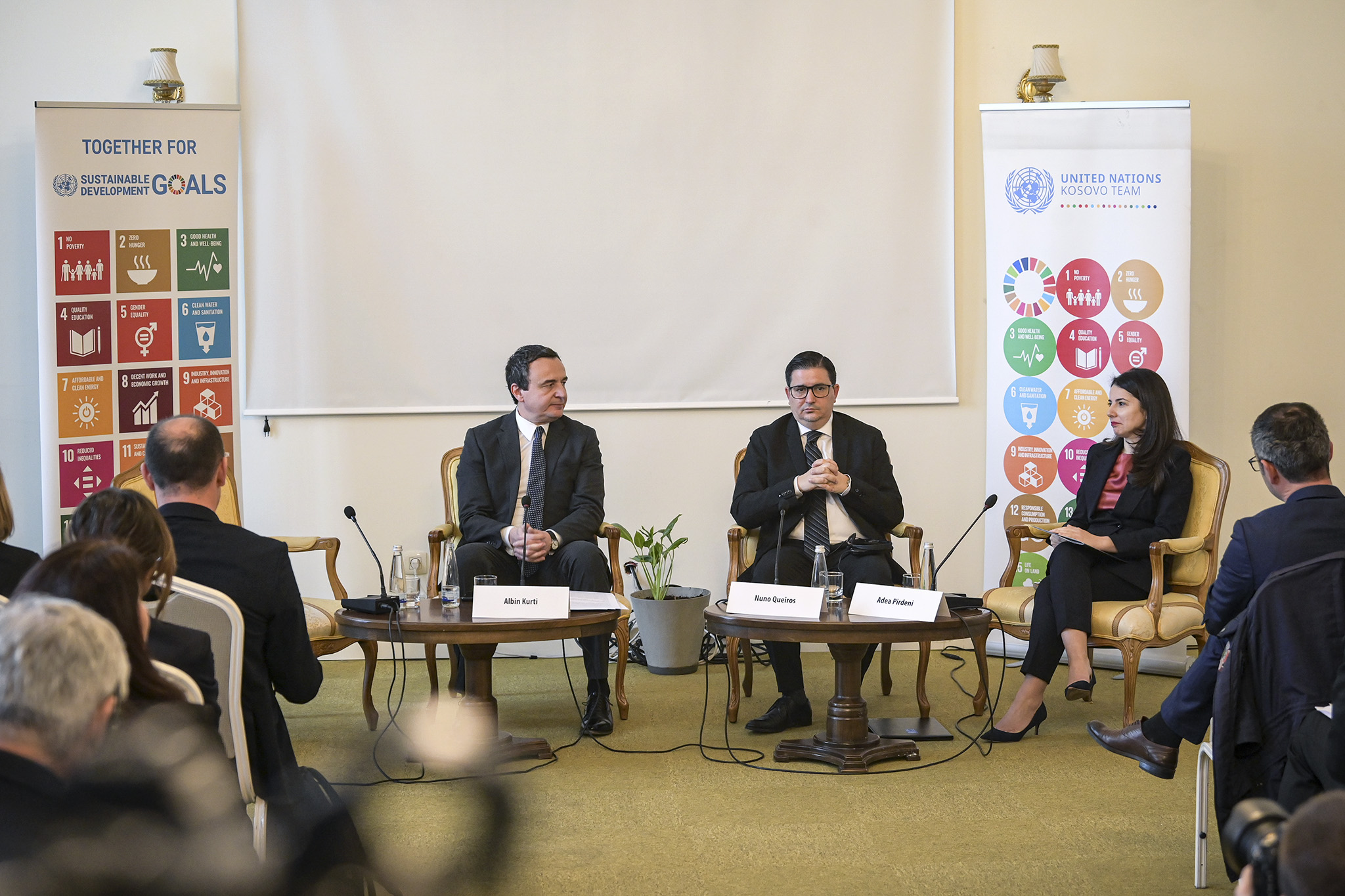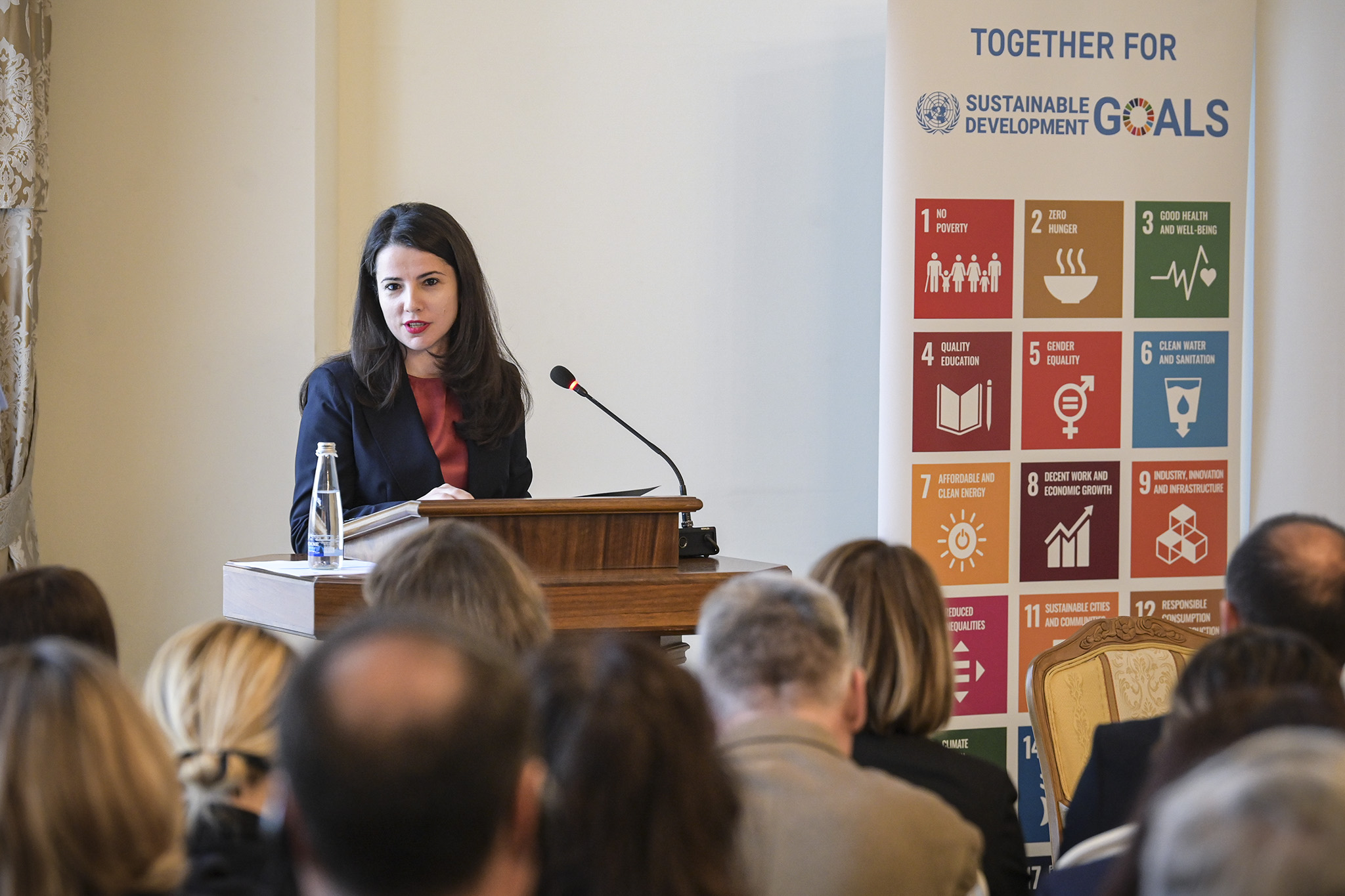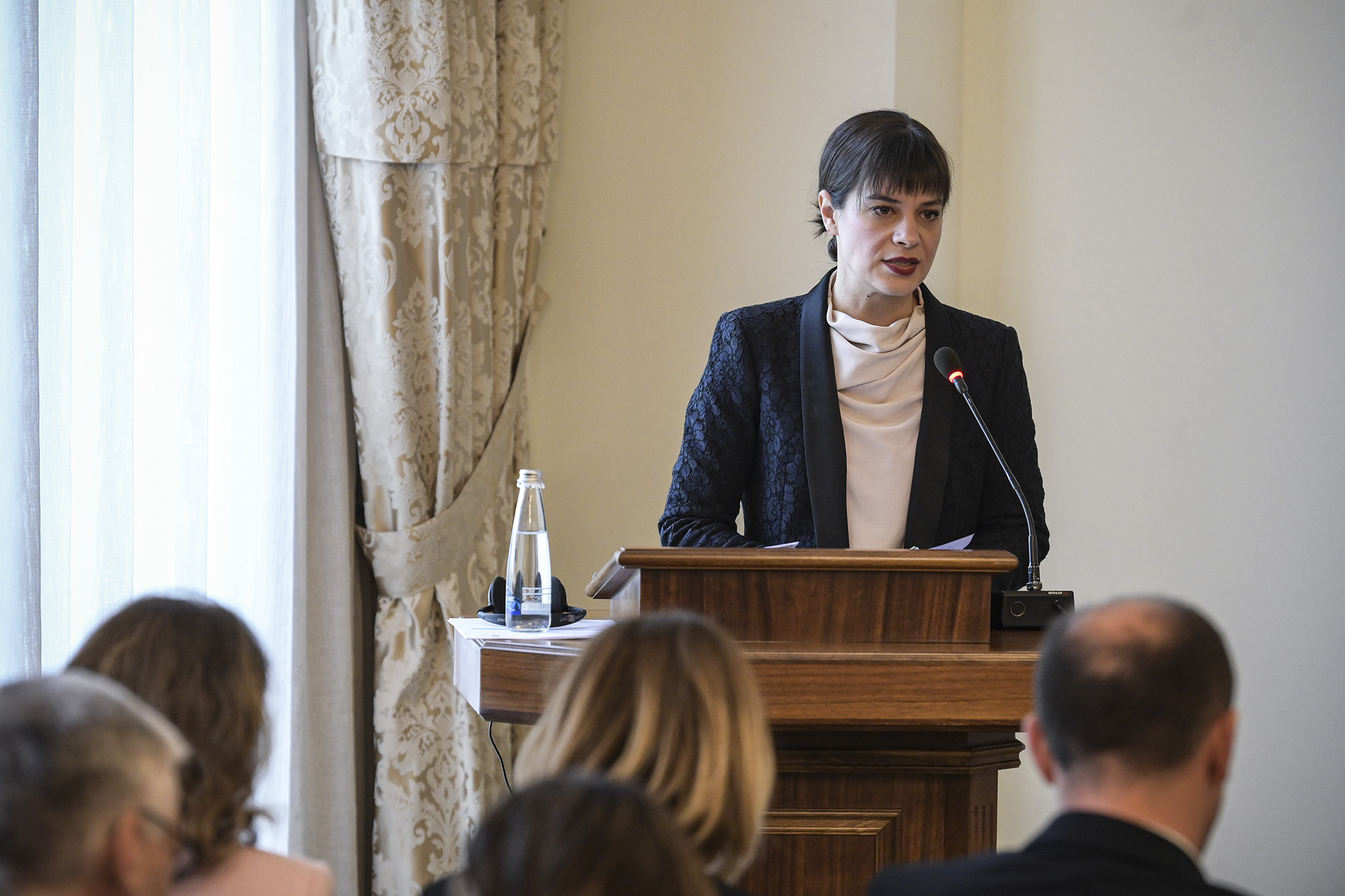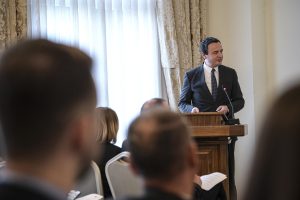Prishtina, November 18, 2024
The Prime Minister of the Republic of Kosovo, Albin Kurti, participated in the Regional Conference “Best Practices for Corruption Prevention – from Policy to Regional Action for Corruption Prevention”, organized by the United Nations Development Programme, UNDP, in Kosovo.
In his speech during the event, Prime Minister Kurti initially stated that the undermining of democracy and human rights and freedoms, which results from corruption, also impacts overall economic growth and societal progress. Not long ago, specifically in the years 2018-2019, Kosovo was presented in the political documents of European Union experts as a captured state.
In Kosovo, corruption was organized, beginning at the top levels and encompassing a broad spectrum of government agencies. Horizontal connections between various branches of the state and government, which also included economic actors from the private sector, were dismantling the state as an independent arbiter of social conflicts. “Administrative hierarchical structures were politically managed and accountable to the vertical chain of power rather than to the citizens, whom public institutions are meant to serve,” stated the Prime Minister.
Furthermore, he said that we have already stopped these and they will not return, as after just one year of successful governance, we rose by 20 numbers in the Transparency International Corruption Perception Index and ranked first in the region for rule of law according to the World Justice Project.
“By focusing on empowering the state rather than interest groups or parallel structures, and on enriching the citizen rather than politicians and their families, we have managed to confirm the public trust as evidenced in the UNDP Public Pulse of July 2024, where more than 50% of citizens indicate that they trust their government and state leaders,” added the Prime Minister.
The Prime Minister highlighted that corruption is no longer considered one of the state’s major issues as it was in the era of previous administrations. He said that those who have enriched themselves at the expense of the people will answer to the Bureau for the Confiscation of Unjustified Wealth, which will soon come into force as a powerful mechanism of our democratic society to return the wealth to the people, the wealth that politicians have plundered and which does not belong to them, but to the citizens of our country.
In conclusion, the Prime Minister stated that corruption in Kosovo has been a systemic issue, never a cultural one. It may have been high, but concentrated at the top, not spread among the people where it becomes a habit and a cultural trait of the population. “Our nation has historically refused institutional corruption, and today, they have succeeded in largely purging it from the system’s institutions, which stem from it and return as a service to it,” Prime Minister Kurti concluded his speech.
Prime Minister Kurti’s full speech:
Honorable Ms. Adea Pirdeni, Minister of State for Public Administration and Anti-corruption in the Republic of Albania,
Honorable Mr. Nuno Queiros, Head of the United Nations Development Programme in Kosovo, UNDP,
Honorable Ms. Tea Blakaj Hoxha, my legal advisor who is responsible for coordinating the national strategy against corruption,
Honorable leaders and representatives of various state institutions,
Honorable attendees from Albania and Bosnia and Herzegovina,
Honorable media representatives,
Ladies and gentleman,
Corruption reveals the opposite of what we stand for as an independent state and a democratic government. The reduction of democracy and human rights and freedoms caused by corruption also influences the general economic growth and the progress of society.
Just a few years back, particularly in 2018-2019, Kosovo was depicted in the political papers of European Union experts as a captured state. The endemic and systematic corruption established extended over all public institutions, distributing itself in the form of bribes and deceit, favoritism and privileges, misuse of official duties, and unlawful enrichment. Such a pervasive distribution of corruption at the institutional level, which threatened to spread throughout society, has not allowed for democratic development or the integration of the Republic of Kosovo into European and international structures.
We cannot and must not dare to forget or forgive this phenomenon we experienced a few years ago. The inability of citizens to develop and enrich themselves at the expense of interest groups was the essence of governance, demonstrated through acquisitions turned into a public secret.
In Kosovo, corruption was organized, beginning at the top levels and encompassing a broad spectrum of government agencies. Horizontal connections between various branches of the state and government, which also included economic actors from the private sector, were dismantling the state as an independent arbiter of social conflicts. Administrative hierarchical structures were politically controlled and accountable to the vertical line of power rather than to the citizens, whom public institutions are supposed to serve.
There was institutional passivity where officials in the system were curious only about who exactly from the authorities had brought someone to the state administrative office this week. Economic operators did not compete in public tenders as they were formed by themselves. Within the business community, it was well-known and precise which tender had established which firm. Above all, these harmed democracy, impoverished the citizen, and undermined the professional decision-making that serves Kosovo, its development, and progress.
We have already stopped these. These will no longer come back, and that dark period for Kosovo is over.
After just one year of successful governance, we had risen by 20 places in the Transparency International Corruption Perceptions Index. The World Justice Project ranks us first in the region for rule of law. By focusing on empowering the state rather than interest groups or parallel structures, and on enriching the citizen rather than politicians and their families, we have managed to confirm the public trust as evidenced in the July 2024 UNDP Public Pulse, where more than 50% of citizens indicate they trust their government and state leaders.
Assessing and diagnosing corruption are crucial components for performing evaluations of the anti-corruption landscape. For Kosovo, different public opinion surveys, indices, and international reports demonstrated that corruption is perceived as a key area that needs attention.
Now, corruption is no longer listed as one of the state’s biggest problems as it was during previous governments. While we are ranked first in the Western Balkans, second in Europe, and third in the world for improvements in political rights and civil liberties according to Freedom House, we are also ranked first in the Western Balkans for electoral democracy according to the V-Dem Institute, highlighting the quality of holding periodic elections.
In the fight against organized crime, we have successfully closed 37 illegal routes and dismantled 124 criminal groups through the dedicated and professional Police of the Republic of Kosovo. Of the 3202 arrested, 301 are public officials. In addition, 18 drug labs and 6 crypto currency labs have been dismantled. Kosovo customs operations have seized and confiscated goods and assets totaling 37 million euros. The new Law against Money Laundering and Terrorist Financing has been approved, which is also the final prerequisite for the Republic of Kosovo’s membership in SEPA – the Single Euro Payments Area.
Above all, we have liberated the northern part of our country from criminal gangs, which were supported, financed, and directed by official Belgrade, and their terror over the citizens has come to an end. We have opened the north for economic development by establishing new businesses with a wide range of quality goods. And for this, I thank all the economic operators who are active there in service of the citizens without distinction. Therefore, prioritize justice, order, law, and efficiency everywhere for economic and democratic progress.
Honorable attendees,
In Kosovo, corruption had led to the maintenance of informal networks, where an unofficial hierarchy of clientelism was superimposed on the state’s official hierarchy. The European Union experts mentioned in their 2018 reports that, and I quote: In Kosovo, where unemployment has reached an alarming rate of 30%, politicians are the wealthiest class in the country. Many large businesses have expanded significantly thanks to the support of politicians, who receive millions in return for their ‘efforts’. This is from the 2018 Progress Report.
Under our administration, unemployment by the end of 2023 stands at 10.7%, and those who have gained wealth at the expense of the people will be accountable to the Bureau for the Confiscation of Unjustifiable Assets, which will soon be enforced. Drafted in accordance with the standards of the Venice Commission, the Law on the Bureau will be a powerful mechanism of our democratic society to return the wealth to the people, the wealth that was plundered by politicians and does not belong to them, but to the citizens of our country. Naturally, this assumes the law won’t undergo the 10-month or even year-long constitutional review by the Constitutional Court, which has been used to postpone nearly every reform initiated and to maintain the governing elements of the past in power.
Our commitment to combating corruption was extended across several dimensions: digitalization of services starting from the public administration and recruitment of officials based on meritocracy and knowledge, connecting systems so that tenders do not end up in the hands of those with criminal records; reforming the Kosovo Prosecutorial Council mired in corporatism according to the Venice Commission; and establishing the Sovereign Fund for rapid development and state democratization.
Regrettably, to the disadvantage of the state of Kosovo, the judicial and prosecutorial system cannot advance at the same pace as the Government of the Republic of Kosovo and our democratic state are moving forward. Still, we are faced with ineffective investigations, weak indictments, acquittals against crime, and worse, lenient sentences for abusers and criminals who harm the family, society, and the state, only to repeat their criminal acts once they are released from prison. The autonomy of the judicial power in decision-making is evident and as such represents a positive sign of a robust democracy. We seek a judiciary that is both independent and professional, alongside a prosecution that is honest and engaged. However, independence does not mean lack of accountability. The judicial system is not independent of the state, it is independent of other branches of power, not from the state, it serves the state, as well as the citizens, who contribute to the budget of our Republic, from which everything is subsequently funded. The public must be restored trust in the judicial and prosecutorial system, which it has been seeking for more than two decades. Trust in the justice system unfortunately does not even have half the support that the government of Kosovo enjoys. Support for the Government of Kosovo in May this year, according to the UNDP survey, is 53.3%, nearly double that for the courts at 27.1%, and more than double that for the Prosecutor’s Office at 26.5%. Therefore, in a country where more than half of the population supports the government, trust in the justice system should be close to 100% and not around a quarter as it currently is.
We are unable and unwilling to intervene in decision-making, but we aim to take steps within our authority to digitize the judicial and prosecutorial system and to provide citizens with electronic access to cases. Digitalization guarantees the transparency of processes, the accountability of officials, as well as the quality of services. Through digitalization, we achieve objectivity in the system, so that for roughly similar actions in roughly similar contexts, we will not have different judgments and even more different punishments. Thus, digitalization serves as the core contribution to system unification and the universality of services. And at this stage, we consistently insist. Thus, the accountability of the judiciary increases, as does the public’s trust in it. As with any other European nation, the Republic of Kosovo will digitize services to achieve complete transparency. By approving the State Strategy against Corruption by the end of this year, we will start this mission together. Fundamental reform in the judiciary and public prosecution, through digitalization and transparency for efficiency and accountability.
Honorable attendees, colleagues, and experts,
The fight against corruption is not merely a legal issue; it is also a matter of social justice and economic development. A democratic society, where citizens have trust in their institutions, is the foundation for sustainable well-being and progress. Having always focused on the citizen and their connection with the state, we have invested in human potential, financial capacity, and stability in public enterprises that were devastated and plundered by previous governments.
Public enterprises, the Republic of Kosovo, and its assets are our immeasurable potential for economic development. Our assets must first and foremost be preserved and cultivated. Economic development through business investment is essential, but not at the irreversible expense of the environment in Kosovo. The maintenance of the state and nature is a responsibility towards the citizen and the generations that come after us. Therefore, Kosovo must first be loved, and then governed and represented.
In the name of enhancing the capacities of public enterprises, we have already seen the first results as early as the first year. The Kosovo Energy Corporation has recorded a profit of over 100 million euros during its management in the year 2021.
Today, the management and the board of directors of Telecom, with full determination and professionalism, continue to fight several arbitration battles as a result of previous contracts with dubious corporations, which have imposed significant financial obligations on public enterprises through unfavorable terms.
In the past, the company faced tens of millions of euros in unpaid debts to various contractors, including the Electronic and Postal Communications Regulatory Authority, as well as the Tax Administration — these burdens have now been eliminated. Today, Telekom of Kosovo is financially stable, with financial profits of 7.1 million euros last year, which represents a significant recovery from the financial losses of previous years, which amounted to over 50 million euros per year.
All these performance improvements are reflected in the opinion of the National Audit Office. Together with financial stability, Telekom of Kosovo is providing better, faster, and more reliable services for all citizens across Kosovo. Telekom has replaced the outdated and unsupported technology, which was last updated in 2015, with a modern system ready for 5G. By the end of the month, BTS stations will be updated in all municipalities of Kosovo, ensuring reliable 5G and 4G+ services.
As a result, Vala is providing high-speed coverage to every corner of the country, including the north and rural areas, many of which for the first time.
Thus, with wise financial investment and enhancement of professional capacities, successes are marked. All these enterprises, into which the investment will flow and grow, will one day become part of the Sovereign Fund in our country – a modern mechanism for development, democratization, and competitiveness with larger and more successful global economies. We must all collectively rejoice in this new chapter and invest with responsibility and integrity in our society, for a better and more successful future, far from negative phenomena such as corruption and misgovernance.
And ultimately, perhaps the simplest and best definition of democracy is the rule of law over politics, not informal connections and others, not parallel structures or alternative hierarchies, but as the state institutions confront corruption through the power of just law. On the other hand, all state officials must also lead by their example. Individuals employed by the state are generally members of the middle class. Whoever greatly enjoys wealth accumulation, let them test their skills and fortune in business. The public sector is to serve others, not itself. Those who are passionate about service, go into the public sector. Those who are passionate about wealth accumulation go into the private sector. No one, no politician, no official should have mistreated the state with a passion for enrichment while holding a public office. This is extremely important for the years and decades to come. Enrichment is legitimate, but not in the public sector. In the public sector, people are generally well-educated and middle-class, and it is the state and the population that should become wealthier, not individuals. But, in this context, it is important to highlight that we are extremely thankful, as institutions representing the people of Kosovo, we would not have achieved this milestone if systemic corruption had turned into a cultural norm. Corruption in Kosovo has been a systemic issue, never a cultural one, meaning it might have been high, but concentrated at the top, not widespread among the population where it becomes a custom or cultural trait of the population.
Our nation has historically refused institutional corruption, and today, they have succeeded in largely purging it from the system’s institutions, which stem from it and return as a service to it.
Thank you.

